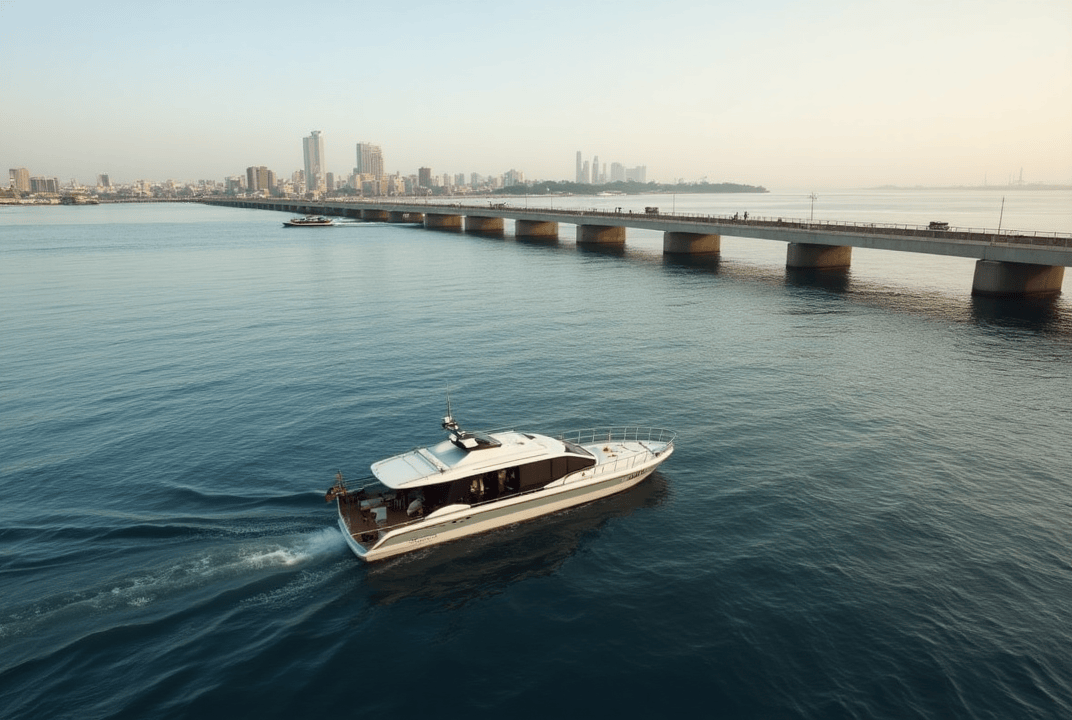<> Viral of Today <>
Home » TOURISM NEWS » Mumbai and Navi Mumbai to Launch New Electric Water Taxi Service Connecting Radio Club Jetty to Navi Mumbai International Airport, Enhancing Travel and Sustainability Tuesday, June 3, 2025Indian authorities, including the City and Industrial Development Corporation (CIDCO) and the Maharashtra ports department, have discussed launching a new water taxi service to connect South Mumbai with the upcoming Navi Mumbai International Airport. The service will operate from the soon-to-be-developed jetty at Radio Club in Colaba and is expected to cut travel times significantly compared to road journeys. Currently, travelers driving via the Mumbai Trans Harbour Link (MTHL) take about 60 to 75 minutes depending on traffic, but the water taxi will reduce this to approximately 40 minutes, saving more than 30 minutes.This water taxi initiative is part of a larger effort to enhance multimodal connectivity to the new airport, incorporating road, rail, metro, and water transport options for seamless access. The use of electric water taxis emphasizes sustainability and offers travelers a cleaner, quieter way to commute.Chief Minister Devendra Fadnavis had earlier stressed the importance of comprehensive transport links to the new airport during a review meeting on April 24, 2025, which accelerated the planning of the water taxi project. At a recent meeting, CIDCO managing director Vijay Singhal presented the proposal to Maharashtra Ports Minister Nitesh Rane, who directed officials to prepare formal plans for constructing the jetty and terminal, as well as to begin approval processes with airport authorities.The Maharashtra Maritime Board will facilitate building the jetty adjacent to the airport to enable direct water access. Minister Rane highlighted that the water taxi would not only improve connectivity between Mumbai and Navi Mumbai but also reduce travel time and fuel consumption. The service will also be integrated into the wider initiative to expand water transport across the Mumbai Metropolitan Region.The benefits of the water taxi are manifold. Travelers can expect shorter, more predictable commutes to the airport, which is crucial for business travelers and tourists alike. Reduced road traffic congestion also means less environmental pollution and less wear on infrastructure. Electric vessels further amplify these sustainability benefits.Integration with existing transport modes is a key feature of the plan. The water taxi service will be linked to other transit systems such as buses, trains, and metro lines, allowing passengers to easily transfer between modes. The new jetty and terminal infrastructure near the airport will support smooth intermodal connections, contributing to a more efficient transport network.This development is poised to have a positive ripple effect on the travel and tourism industries. Improved airport access can increase passenger volumes, boost tourism in the region, and stimulate local economies. Hotels, restaurants, and tour operators stand to gain as travelers find it easier to reach their destinations.Looking ahead, the water taxi project may serve as a model for other cities in India with navigable waterways, showcasing how integrating water-based transport can alleviate urban congestion and promote sustainable mobility. This aligns with a global trend where cities use rivers, canals, and coasts as viable transit corridors.Globally, the adoption of electric water taxis reflects growing environmental awareness and efforts to reduce carbon footprints in urban transport. Travelers increasingly prefer eco-friendly options, and such innovations can enhance the appeal of destinations.Key points to note include the launch of the water taxi service from Radio Club jetty in Colaba to the Navi Mumbai airport jetty, the expected 40-minute travel time, the use of electric vessels, and the facilitation by Maharashtra Maritime Board. The initiative supports Chief Minister Fadnavis’s directive to provide multimodal transport connectivity to the airport and integrates with Mumbai Metropolitan Region’s water transport expansion.In conclusion, the introduction of the water taxi service will transform how passengers access Navi Mumbai International Airport, offering a faster, greener, and more efficient alternative to road travel. This will enhance traveler convenience, support environmental goals, and promote the growth of tourism and commerce in Mumbai and Navi Mumbai.The project exemplifies India’s commitment to innovative and sustainable urban transport solutions, setting a precedent for similar initiatives nationally and internationally. As urban populations grow and mobility demands increase, integrated transport solutions like this water taxi service are critical to maintaining livable and accessible cities.
This information will surprise you!
See also
- Read until the end to discover everything.
- Important information you need to know.
- Interesting facts and helpful tips.
Conclusion
Did you enjoy the news? Keep following us daily!

